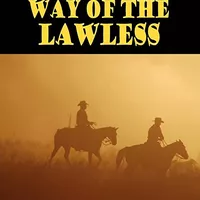CHAPTER 24
The thought of Jud now took him up the back trail of Andrew Lanning. He leaned far over with the lantern, studying with intense interest every place where the wounds of the injured man might have left telltale stains on the rocks or the grass. When he had apparently satisfied himself of this, he turned and ran at full speed back to the house and went up the ladder to Andrew. There he took the boots—they were terribly stained, he saw—and drew them on.
The loose boots and the unaccustomed weights tangled his feet sadly, as he went on down the ladder, but he said not a word to his grandfather, who was far too dignified to make a comment on the borrowed footgear.
Again outside with his lantern, the boy took out his pocket-knife and felt the small blade. It was of a razor keenness. Then he went through the yard behind the house to the big henhouse, where the chickens sat perched in dense rows. He raised his lantern; at once scores of tiny, bright eyes flashed back at him.
But Jud, with a twisted face of determination, kept on with his survey until he saw the red comb and the arched tail plumes of a large Plymouth Rock rooster.
It was a familiar sight to Jud. Of all the chickens on the place this was his peculiar property. And now he had determined to sacrifice this dearest of pets.
The old rooster was so accustomed to his master, indeed, that he allowed himself to be taken from the perch without a single squawk, and the boy took his captive beyond the pen. Once, when the big rooster canted his head and looked into his face, the boy had to wink away the tears; but he thought of the man so near death in the attic, he felt the clumsy boots on his feet, and his heart grew strong again.
He went around to the front of the house and by the steps he fastened on the long neck of his prisoner a grasp strong enough to keep him silent for a moment. Then he cut the rooster's breast deeply, shuddering as he felt the knife take hold. Something trickled warmly over his hands. Dropping his knife in his pocket, Jud started, walked with steps as long as he could make them. He went, with the spurs chinking to keep time for each stride, straight toward a cliff some hundreds of yards from the house. The blood ran freely. The old rooster, feeling himself sicken, sank weakly against the breast of the boy, and Jud thought that his heart would break. He reached the sharp edge of the cliff and heard the rush of the little river far below him. At the same time his captive gave one final flutter of the wings, one feeble crow, and was dead.
Jud waited until the tears had cleared from his eyes. Then he took off the boots, and, in bare feet that would leave no trace on the rocks, he skirted swiftly back to the house, put the dead body back in the chicken yard, and returned to his grandfather.
There was one great satisfaction for him that evening, one reward for the great sacrifice, and it came immediately. While the old man stood trembling before him, Jud told his story.
It was a rich feast indeed to see the relief, the astonishment, the pride come in swift turns upon that grim old face.
And yet in the end Pop was able to muster a fairly good imitation of a frown.
"And here you come back with a shirt and a pair of trousers plumb spoiled by all your gallivantin'," he said, "not speakin' of a perfectly good chicken killed. Ain't you never goin' to get grown up, Jud?" "He was mine, the chicken I killed," said Jud, choking. It brought a pause upon the talk. The other was forced to wink both eyes at once and sigh.
"The big speckled feller?" he asked more gently.
"The Plymouth Rock," said Jud fiercely. "He wasn't no speckled feller! He was the finest rooster and the gamest—" "Have it your own way," said the old man. "You got your grandma's tongue when it comes to arguin' fine points. Now go and skin out of them clothes and come back and see that you've got all that—that stuff of'n your face and hands." Jud obeyed, and presently reappeared in a ragged outfit, his face and hands red from scrubbing.
"I guess maybe it's all right," declared the old man. "Only, they's risks in it. Know what's apt to happen if they was to find that you'd helped to get a outlaw off free?" "What would it be?" asked the boy.
"Oh, nothin' much. Maybe they'd try you and maybe they wouldn't. Anyways, they'd sure wind up by hangin' you by the neck till you was as dead as the speckled rooster." "The Plymouth Rock," insisted Jud hotly. "All right, I don't argue none. But you just done a dangerous thing, Jud. And there'll be a consid'able pile of men here in the mornin', most like, to ask you how and why." He was astonished to hear Jud break into laughter.
"Hush up," said Pop. "You'll be wakin' him up with all that noise. Besides, what d'you mean by laughin' at the law?" "Why, granddad," said Jud, "don't I know you wouldn't never let no posse take me from you? Don't I know maybe you'd clean 'em all up?" "Pshaw!" said Pop, and flushed with delight. "You was always a fool kid, Jud. Now you run along to bed."

